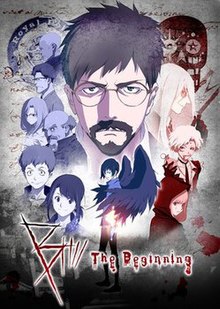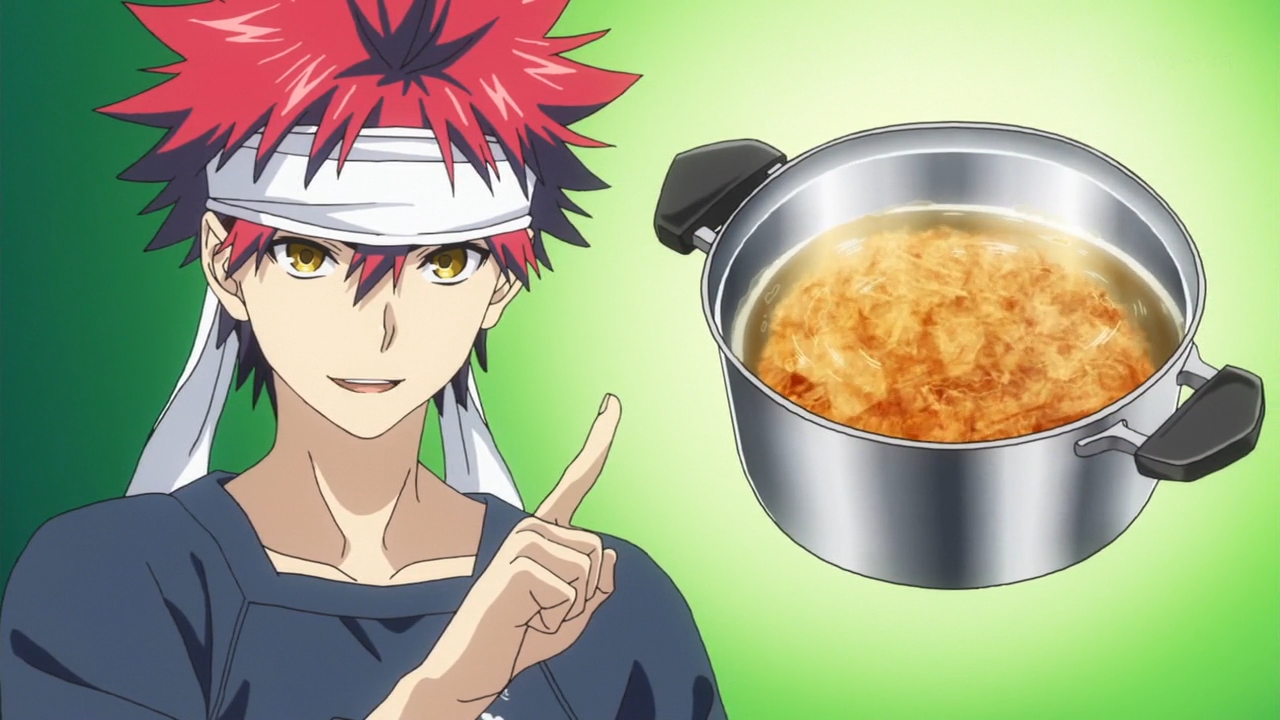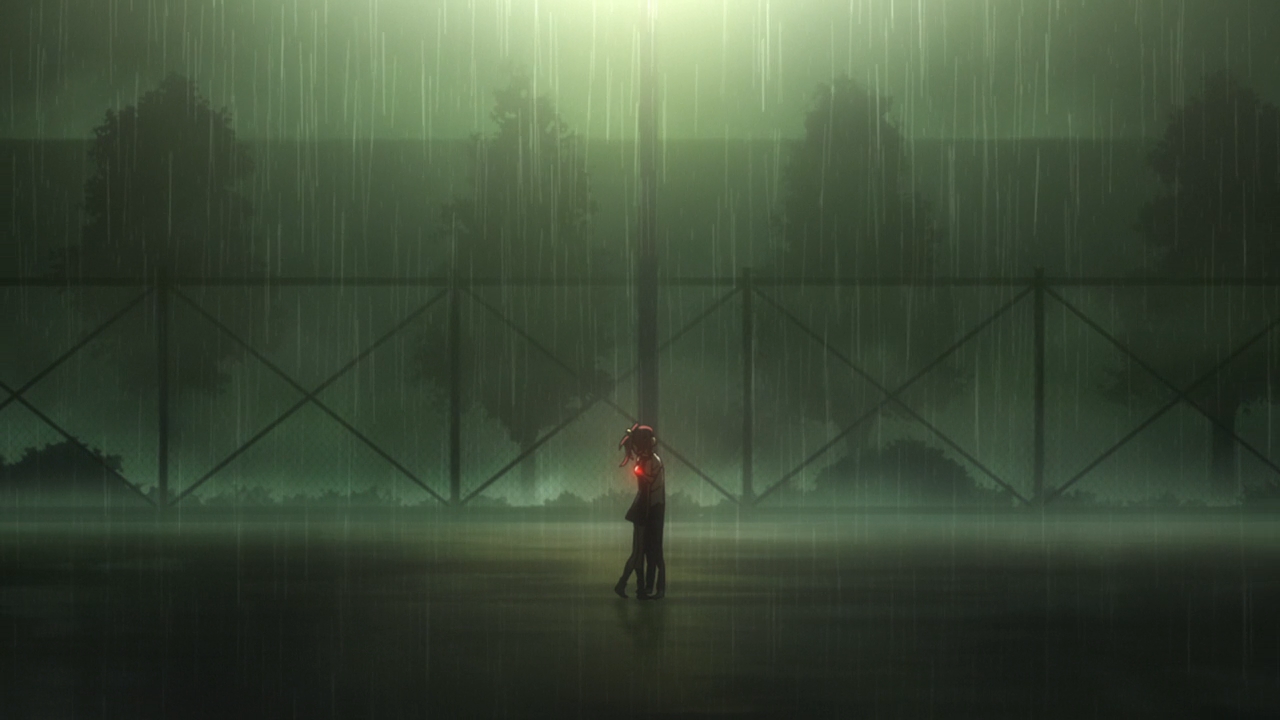10. Psycho-Pass
This cyberpunk police drama filled a niche for anime fans hungry for the gritty science fiction titles of years past. With its
Minority Report-ish premise, dark color palette, and transforming weapon designs with blue blinky bits,
Psycho-Pass has the look and feel of
Ghost in the Shell or
Blade Runner—though
it doesn’t, unfortunately, manage to fill those illustrious shoes.
While the dystopian themes of the show never quite materialized in the
way we had hoped and some character arcs didn’t receive the focus they
deserved, the diverse cast, clever villain, and the infamous
ruthlessness of writer Gen Urobuchi (
Madoka Magica) kept us entertained and on our toes until the very end. We’re looking forward to seeing what the second season brings in 2014.
9. WataMote—No Matter How I Look at It, It’s You Guys Fault I’m Not Popular
Whether or not you liked
WataMote will probably depend on what level you can sympathize with protagonist Tomoko’s plight. A cringe-comedy in the vein of
Welcome to the NHK,
WataMote
finds humor in what is actually a terribly sad situation: that of an
awkward loner who can’t understand why she’s not the most popular girl
in school. In the wrong hands this odd little show could have been a
disaster, but quirky, stylized visuals and adroit handling of tone
really brought out the best in the material, creating a show that
balances humor and pathos almost disturbingly well. A word must also be
said for Izumi Kitta, Tomoko’s voice actor, whose voice-cracking
performance deserves credit for many of the funniest moments in the
show.
8. Free!
 Free!
Free!
is a solid sports anime filled with beautiful animation and lots of
light-hearted fun. Although it at times tends too much towards melodrama
for our tastes, it also had a good sense of humor and an excellent
grasp of its character interaction—this is the kind of show you can just
tell the whole staff had a great time making. The show is sure to be a
major point of contention for years to come, but love it or hate it,
Free! was one of the more interesting phenomena of 2013, and a pretty darn fun sports show to boot.
7. Shin Sekai Yori / From the New World
Shin Sekai Yori was one of the most fascinating anime of the
year, though it seems to have been largely overlooked in favor of its
dystopian cohort,
Psycho-Pass. This far-future science fiction
show not only presented a well-constructed future world and culture, but
was one of those anime that really makes the most of the medium,
combining a variety of animation styles and some truly stunning design
elements. The show is at times quite uneven in quality, with some pacing
issues and directorial missteps over its 25 episode run—although
considering that the plot covers a span of twenty-four years, it flows
much better than one might expect. But uneven as it may be, when
Shin Sekai Yori is good, it’s brilliant, and very much worth watching to the final conclusion.
6. Little Witch Academia
Not a show exactly, but
Little Witch Academia deserves a place on this list nonetheless. Studio Trigger’s
Anime Mirai entry for 2013,
Little Witch Academia is a delightful twenty-five minute mashup of Harry Potter and Saturday morning cartoons rendered in
beautiful, fluid animation with a playful, Looney-Tunesish style. But aside from being the most magical fun you can experience in less than half an hour,
Little Witch Academia
is also worth a mention in that it marks an interesting trend in 2013:
the rise of Kickstarter as an avenue for funding anime production. The
popularity of
Little Witch Academia allowed Trigger to successfully
Kickstart a sequel now slated for 2015, and they’ve not been the only ones—Production IG and Masaki Yuasa’s Kickstarted anime
Kick-Heart won a gaggle of awards at film festivals worldwide this year, and
Kenji Itoso’s Santa Company project
is in its last few hours as we speak. The trend represents exciting
potential for Western fans to have a voice in anime production,
something that would have been considered impossible in years past.
5. Hataraku Maou-sama! / The Devil is a Part-Timer
Hataraku Maou-sama! managed to rise above its seemingly tired
and generic premise (a fish-out-of-water comedy with an evil being?
Never heard that one before) to be a fresh and incredibly fun romp.
Watching a great and terrible demon lord scrape together the next
month’s rent while working at MgRonalds is amusing enough, but
Maou-sama’s
success is all in the execution: creative direction and character
animation combined with great performances from the entire cast
(including the protagonists performing much of the first episode in a
fantasy language) made this show one of the most entertaining comedies of the year.
4. Silver Spoon / Gin no Saji
To be quite honest,
Silver Spoon didn’t have to work very hard to be a success: based on an award-winning, bestselling manga by Hiromu Arakawa (
Fullmetal Alchemist), the folks making this adaptation would have had to work hard to screw it up.
Silver Spoon is
everything we were promised: a heartwarming tale about farm animals and
adolescent self-discovery. Balancing protagonist Hachiken’s personal
struggles and relationships with a broad cast of characters,
Silver Spoon
deals gracefully with both the hardships and rewards of agricultural
life, not fearing ambiguous answers to the ethical questions it raises.
The show’s greatest success, though, besides teaching us more about
dairy farming than we ever thought we wanted to know, is in capturing
that balance of seriousness and humor that Arakawa so excels at creating
in her work. The second season will be airing in January, and as far as
we’re concerned it can’t come soon enough.
3. Attack on Titan / Shingeki no Kyojin
Of course no look at anime in 2013 could possibly avoid discussing
Attack on Titan—certainly, if not the best, the most colossal (har har) anime of the year.
Attack on Titan
delivered some of the most spectacular action sequences and memorable
characters of the year, capturing a huge audience with its mix of
fantasy, action, and intrigue. Despite being plagued with production
issues and suffering from some painfully glacial pacing in order to
stretch the material over the full 25 episodes,
Attack on Titan’s
portrayal of the desperate fury of Eren and his cohorts in the Survey
Corps as they fight against the titan menace made for one of the most
exciting shows of the year. And can we just get a word in about Hiroyuki
Sawano’s dramatic musical score for this show? Watching titans devour
Eren’s friends just wouldn’t have been the same without it.
2. Kyousougiga
Kyousougiga has been several years in the making, beginning
with a standalone web short in 2011 which was a bit of a jumble—a
beautiful, exciting jumble, but utterly incomprehensible in terms of
actual plot. Many among us thought there might be something wonderful
there, if only Toei would give its animators a break from working on
PreCure to make a real go of it
. At last, our patience was rewarded: finally given a ten episode run this year,
Kyousougiga has proven that there was something magical behind that first short. With fantastic art and a colorful, dynamic visual style,
Kyousougiga’s
looks alone would almost be enough to put it on this list, but the
visuals support a lovingly developed mythology, strong characters, and a
compelling family saga that traverses both death and dimension. The
slightly convoluted plot is well worth the effort—rarely are we treated
to something so original and imaginative as
Kyousougiga.
1. Uchouten Kazoku / The Eccentric Family
Mixing family drama, Japanese mythology, and a magically realistic alternate Kyoto, it’s easy to see why
Uchouten Kazoku was our favorite show of 2013. This title delivered in every department: a thoughtful plot provided by a Tomihiko Morimi (
The Tatami Galaxy)
novel, beautiful art and animation, and lovable characters brought to
life by a great voice cast all came together to create a show that was
both comedic and heartbreaking. Though
Uchouten Kazoku seems to
meander at some points, taking its time building a complex world of
tanuki, tengu, and humans, the show is self-confident in its wanderings,
and never loses sight of its larger themes and character arcs in this
story of loss and family legacy.
 Title: Higashi no Eden
Title: Higashi no Eden









 Title: Mimi wo Sumaseba
Title: Mimi wo Sumaseba
 Title: Kaze Tachinu
Title: Kaze Tachinu
 Title: Kimi no Na wa.
Title: Kimi no Na wa. Title: Hotaru no Haka
Title: Hotaru no Haka








 Title: Little Witch Academia (TV)
Title: Little Witch Academia (TV) Title: Free!
Title: Free! Title: Free!: Eternal Summer
Title: Free!: Eternal Summer








 Title: Shokugeki no Souma
Title: Shokugeki no Souma
 Title: Kiznaiver
Title: Kiznaiver